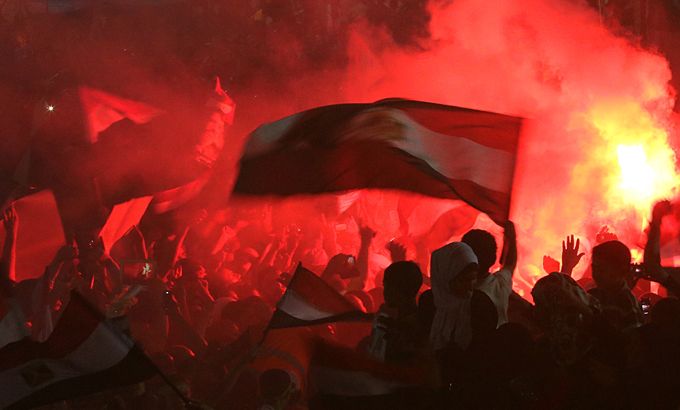Morsi supporters defy orders to end sit-ins
Rallies continue and clashes with police erupt in Egypt’s capital even as foreign pressure to solve crisis mounts.

Backers of Egypt’s deposed President Mohamed Morsi have staged defiant rallies and clashed with police in Cairo, after the government ordered their protest camps to be broken up.
Police reportedly fired tear gas and birdshot at roughly 1,000 protesters on Friday who tried to set up a new camp outside Media Production City, where satellite television channels are based.
The US stepped up its diplomatic efforts, meanwhile, sending its top Middle East official to Cairo for a second time.
William Burns, US undersecretary of state, is the latest international envoy on a mission to press Morsi’s backers and the interim government to resolve the stand-off peacefully.
Elsewhere, Ayman al-Zawahiri, the Egyptian-born head of al-Qaeda, accused the US of “plotting” Morsi’s overthrow with the Egyptian military and the country’s Christian minority.
“Crusaders and secularists and the Americanised army have converged … with Gulf money and American plotting to topple Mohamed Morsi’s government,” he said in a 15-minute audio recording posted online.
In his first comments since July 3 – when Morsi was removed from power, Zawahiri also attacked Morsi’s secular opposition and Coptic Christians, who he said wanted a secessionist state in Egypt, and called for a mass movement to install Islamic law.
Dispersing rallies
In Cairo, Morsi supporters went on marches after Friday prayers, pouring out of several mosques in the capital.
The early evening protest outside Media Production City saw at least one protester wounded by birdshot.
The demonstrators said police fired tear gas when they tried to camp outside the compound.
However, the interior ministry accused the protesters of firing birdshot, wounding a conscript, and said police made 31 arrests.
Morsi’s supporters have remained defiant even after the interim government warned this week that police would be authorised to disperse crowds in “gradual steps”.
In particular, the interior ministry urged those at protest sites in Rabaa al-Adawiya and Nahda squares “to let reason and the national interest prevail, and to quickly leave”.
The state-owned Al-Ahram newspaper reported on Friday that police had a plan to disperse the sit-ins but were holding out for a peaceful resolution.
More than 250 people have been killed since Morsi’s removal from power on July 3 and diplomatic efforts to avoid further bloodshed have picked up pace this week.
Foreign pressure grows
Burns’ arrival in Cairo on Friday night was preceded by trips by the EU’s foreign policy chief, Catherine Ashton, and Middle East envoy, Bernardino Leon; Guido Westerwelle, the German foreign minister; and Alpha Oumar Konare, an African Union delegate.
Ashton and Konare both met Morsi, who is detained, and reported that he was in good health.
A senior member of the Freedom and Justice Party, the political arm of Morsi’s Muslim Brotherhood, said the European envoys had asked them to end their sit-ins.
They have also been angered by comments from John Kerry, the US secretary of state, who told Pakistani television that Egypt’s military was “restoring democracy”.
Rights group Amnesty International meanwhile demanded an investigation into allegations that Morsi’s supporters tortured opponents in Cairo near their protest camps.
It said opponents of Mori reported being “captured, beaten, subjected to electric shocks or stabbed by individuals loyal to the former President.”
Morsi has been formally remanded in custody on suspicion of offences when he broke out of prison during the 2011 revolt that toppled former president Hosni Mubarak.
Prosecutors have also referred three top Muslim Brotherhood leaders, including supreme guide Mohamed Badie, for prosecution on allegations of inciting the deaths of demonstrators.